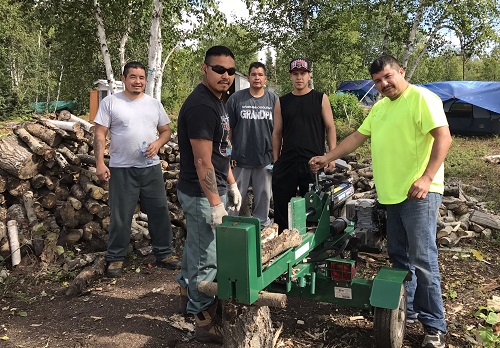“Excellent collaboration with the Besnard Correctional Center,” Vince Natomagan wrote to accompany this photo on his Twitter.
Besnard Lake Correctional inmates are taking part in an addictions recovery camp by Pinehouse Lake.
The Recovery Lake camp has done four separate thirty-day sessions this year. New to the August session was the addition of between four and 16 men of Dene and Cree descent from the area who were previously attending Alcoholics Anonymous in Pinehouse Lake.
For about three weeks in August, the men joined in Recovery Lake’s cultural activities during the day.
“We don’t label these people as convicts or dangerous. They’re extremely low risk, they were there for alcohol-related offences generally speaking and they’re not dangerous offenders. They’re basically our relatives from Northern Saskatchewan,” said coordinator Vince Natomagan.
The group was able to eat moosemeat or fish, speak their language, go out boating or waterskiing, chop wood for the camp, and take part in the other activities at the camp. Natomagan said “we were all moved” when the Besnard Lake group donated tables, benches, and sinks to the camp. He said he’s happy to see the justice system legitimizing their local efforts collaborating with local efforts, but also said they’re not likely to start taking people who are not from the community because of limited space and funds.
In addition to the guests from Besnard Lake, there were 15 people who took part in daily counselling and went through a detox phase with help from health professionals. Natomagan said these people are weaned off the substance they’re addicted to, meaning they are able to drink alcohol or take small portions of drugs for the first seven days of the camp.
By the end of camp, attendees will have had the opportunity to get eight different safety tickets to help guide them to productive work once they return to the community. Natomagan admits there are slip-ups, and there are not always enough supports in place to keep people with so many social challenges from returning to their old habits.
Recovery Lake is managed through the Reclaim Our Community group, which includes the RCMP, local healthcare professionals and community members. The money to run Recovery Lake comes from “a heck of a lot of fundraising” and a trust that was created through a collaboration agreement with Cameco, Natomagan said.
It will not run in winter because the cabins are not winterized.
